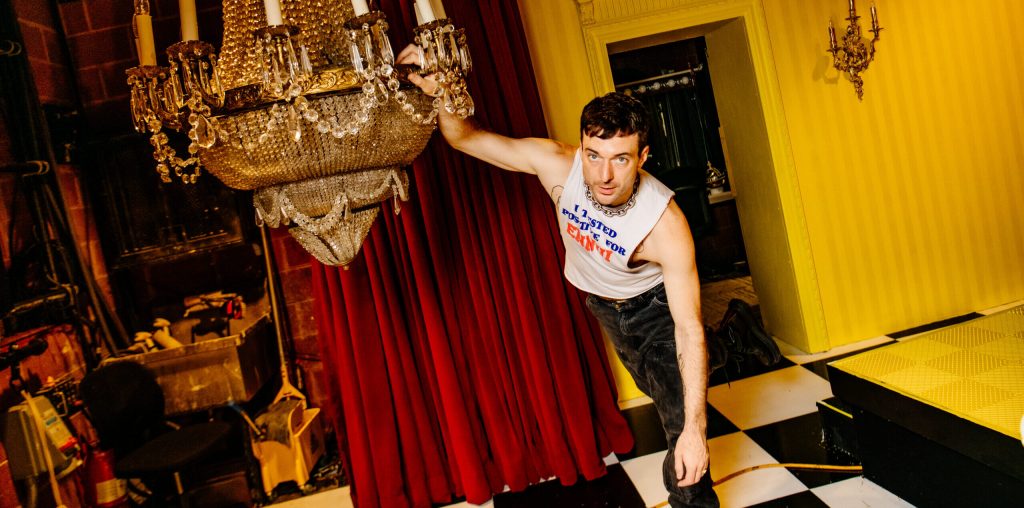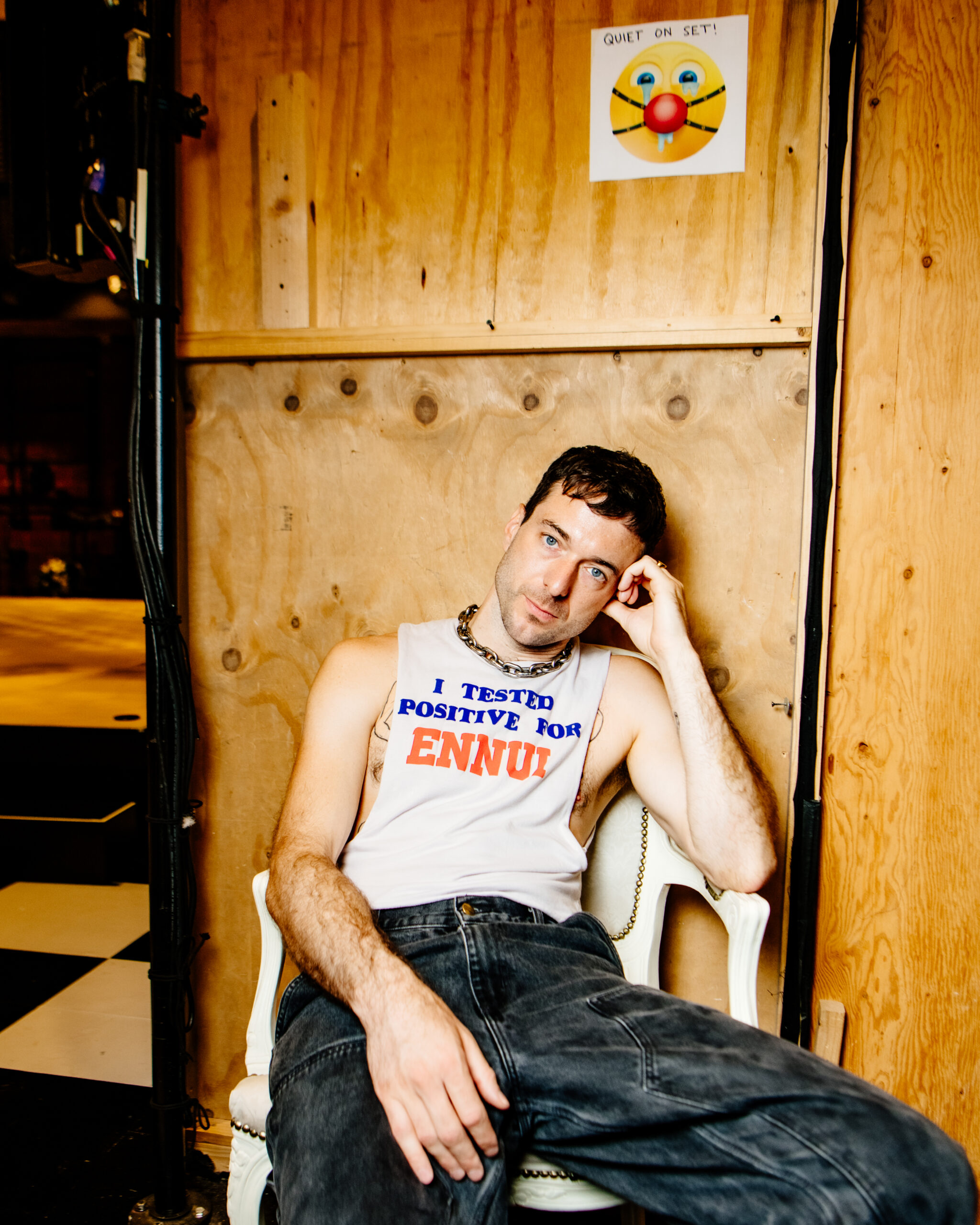
Jordan Tannahill, photographed by Hunter Abrams.
In 2017, a photo of a then four-year-old Prince George on a helicopter in Germany went viral. By this point in his young life, the British heir had already had his picture taken thousands of times. But in this particular image, the Prince looked a little, well, fruity. For the playwright Jordan Tannahill, this wasn’t merely an occasion to crack jokes online, as it was for the rest of us. As he told Tony Kushner last week, “It began to trigger these series of thoughts: the strong self-identification I had with that photograph and how much I recognized my younger, unguarded queer self in that image.” So Tannahill began to write Prince Faggot, a salacious, empathetic, and very funny exploration of power, sexuality and monarchy now running at Playwrights Horizons in a co-production with Soho Rep through August 3rd. At its core is a surprisingly generative inquiry: “Would it be so outrageous to imagine the heir to the British throne having a life that resembles my own?” Among the show’s many admirers is Kushner, the Pulitzer Prize-winning playwright and screenwriter who knows a thing or two about pushing the envelope onstage. After seeing Prince Faggot, he joined Tannahill for a wide-ranging conversation about kink, shame, fascism, royalty, and reckoning with identity in art.
———
TONY KUSHNER: Hey, Jordan.
JORDAN TANNAHILL: Hi.
KUSHNER: Where are you?
TANNAHILL: I am on Fire Island.
KUSHNER: Oh, okay.
TANNAHILL: I’m staying here with Julio Torres. Do you know Julio?
KUSHNER: I said hello to him once. I don’t even think I introduced myself. I just went up to him in a picket line during the strike and said, “Oh, I love your work.” And he said, “Great,” and that was it. It was quite wonderful. How long are you out there?
TANNAHILL: Just for a week. It’s been beautiful. The house is still waking up. We were dancing on the beach last night at a rave, all of us just coupling off having sex under the stars with the sound of the waves and the throbbing music in the background and thinking, “This is a pretty special thing that these gays made for themselves here.” But I’ve been looking forward to talking again since it was so nice seeing you guys in P-town a couple of weeks ago. I still have your Alaska sweatshirt that you so generously gave me.
KUSHNER: It’s your sweatshirt now, darling. I want to start off asking you to talk about the road to writing Prince Faggot. Like, how long you’ve been working on it, where the idea originally came from, maybe a little bit about how it did or didn’t metamorphose from the time you first started working on it. It’s not a Playwrights Horizons production, right? It’s Soho Rep?
TANNAHILL: It’s a co-production, actually, between the two theaters.
KUSHNER: Great.
TANNAHILL: I began writing the play back in 2020 while I was living in London, and I sort of trace the origins of my thinking around the show and its genesis in that opening monologue that Mihir Kumar performs whereby I stumbled upon that photograph of Prince George, as so many of us did on Twitter back in 2017. It began to trigger these series of thoughts: the strong self-identification I had with that photograph and how much I recognized my younger, unguarded queer self in that image. I remember being a preteen and stumbling across childhood photographs of myself looking so fey and being filled with this kind of unnameable shame and actually ripping them up before I had come out and began working through that shame. So the thought experiment began from there around what the possible broader implications of this might be for the Royal Family.
KUSHNER: You immediately sort of politicized it and problematized it, questioning the negative internet response to gay men looking at that picture of Prince George, somebody who had an early sexual orientation manifested into him. That, to me, is part of the thrill of the play. That nothing is allowed to become entirely personal without also being explored as a political social concern as well.
TANNAHILL: Absolutely. How do we give language to the thorny question of queer childhood without having it weaponized against us? This is the discourse that is already following the show now. In Britain, the tabloids have caught onto the show and are using that kind of language. The Daily Mail has been the least cautious, but it’s really the comment sections that are just rife with these accusations of pedophilia and so forth. But I think the show tries to parse these things out with some nuance and care. In many ways, this was a kind of self-portrait. Would it be so outrageous to imagine the heir to the British throne having a life that resembles my own?
KUSHNER: Yeah.
TANNAHILL: Everything that this fictional character experiences as a gay man are challenges that I have wrestled with.
KUSHNER: Right.
TANNAHILL: His relationship with the self-obliterating drive toward excess, whether through sex or drugs or the desire to know oneself and transcend oneself through pleasure and through sex, relationships, love, how this runs up against his obligations to his family. In 2020, I was working through a lot of these questions within my life, within my relationships. I think a lot of gay men go through these thresholds of identity and reckoning.
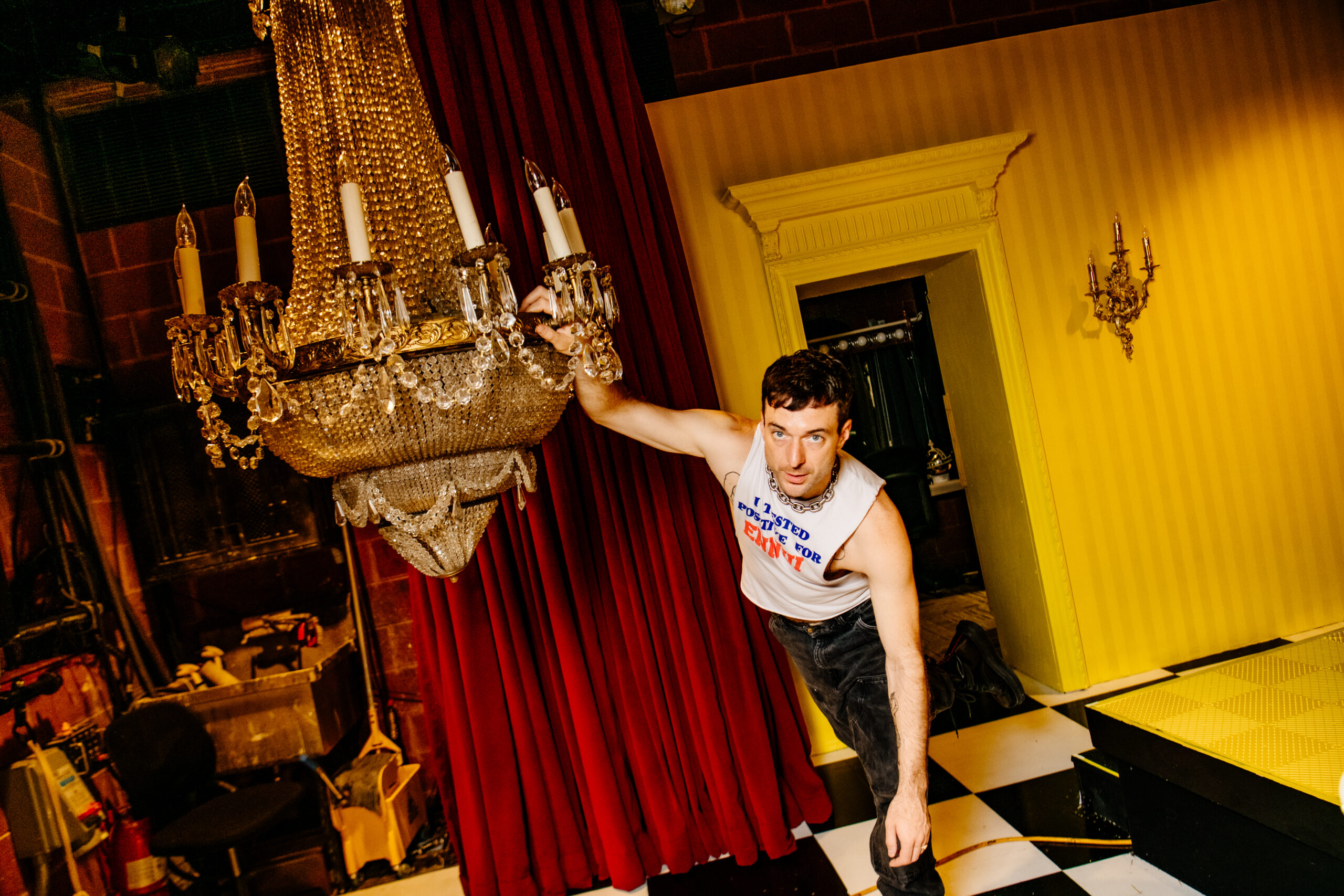
KUSHNER: One thing that’s really startling in the play is the portrait of William and Kate. I mean, I’m not a fan of the Royals, but—
TANNAHILL: I’m not either, just to make it clear.
KUSHNER: It was kind of inescapable, these stories about William sounding like he was not necessarily the nicest guy, and I’ve heard various stories about her. Although they are revealed in the play as—I don’t want to give anything away.
TANNAHILL: [Laughs] It’s fine.
KUSHNER: They’re not without their dark side. But as parents to George and Charlotte, they’re kind of long-suffering and they fuck up, but they’re decent. And the scene between William and George is incredibly moving. I mean, it’s the idea that this guy who is a Windsor and has been raised in that hothouse bizarre atmosphere might actually have no problem accepting him as gay, which I also wanted to talk to you about.
TANNAHILL: Yeah.
KUSHNER: I thought there was just an enormous generosity that you’ve extended to them. Maybe more than they deserve, I suspect, but I don’t know. A lot of gay drama is about how fucking awful people’s parents were.
TANNAHILL: Right.
KUSHNER: But not every queer person had terrible parents. I mean, George is sort of more of an asshole than either of them for a lot of the play.
TANNAHILL: Well, one thing that the play’s wonderful director, Shayok Misha Chowdhury, said was, “Let’s remember that Kate and William are millennials.” They’ve actually gone on record, after those photographs were circulating of George, that he was in ballet class. This raised some eyebrows and they went on record saying, “Whatever sexual identity our children have, we will embrace them and support them.” And I thought, “Right, okay. So the central drama here will not be George’s coming out.” I think a lot of us maybe have a certain fatigue around the “coming out” drama, so this was not going to be that. It was important to me that this was also not broad satire. It’s kind of like ballroom realness. How authentically and fully can we step into and embody these individuals and, in so doing, really analyze and deconstruct the distance between them and ourselves and our respective lived experiences?
KUSHNER: Satire is one thing it absolutely isn’t. It’s the sort of absolutely unique weirdness of being in the Royal family of England. I mean, there shouldn’t be any Royal families at this point. We’re in the 21st century, for fuck’s sake.
TANNAHILL: Yeah.
KUSHNER: But the unreality that’s visited on these people by virtue, I mean, it’s celebrity distilled into a kind of purity that has nothing to do with anything you’ve done or anything you pretend that you’re going to do. It’s entirely about birth and this giant machinery of state, with all of its history kind of pouring oil on your head. It’s a nightmare. And I loved how delicately the play, even in the sex scenes, allows you to sort of play around. They’re human beings in a completely bananas situation, and I thought that was amazing.
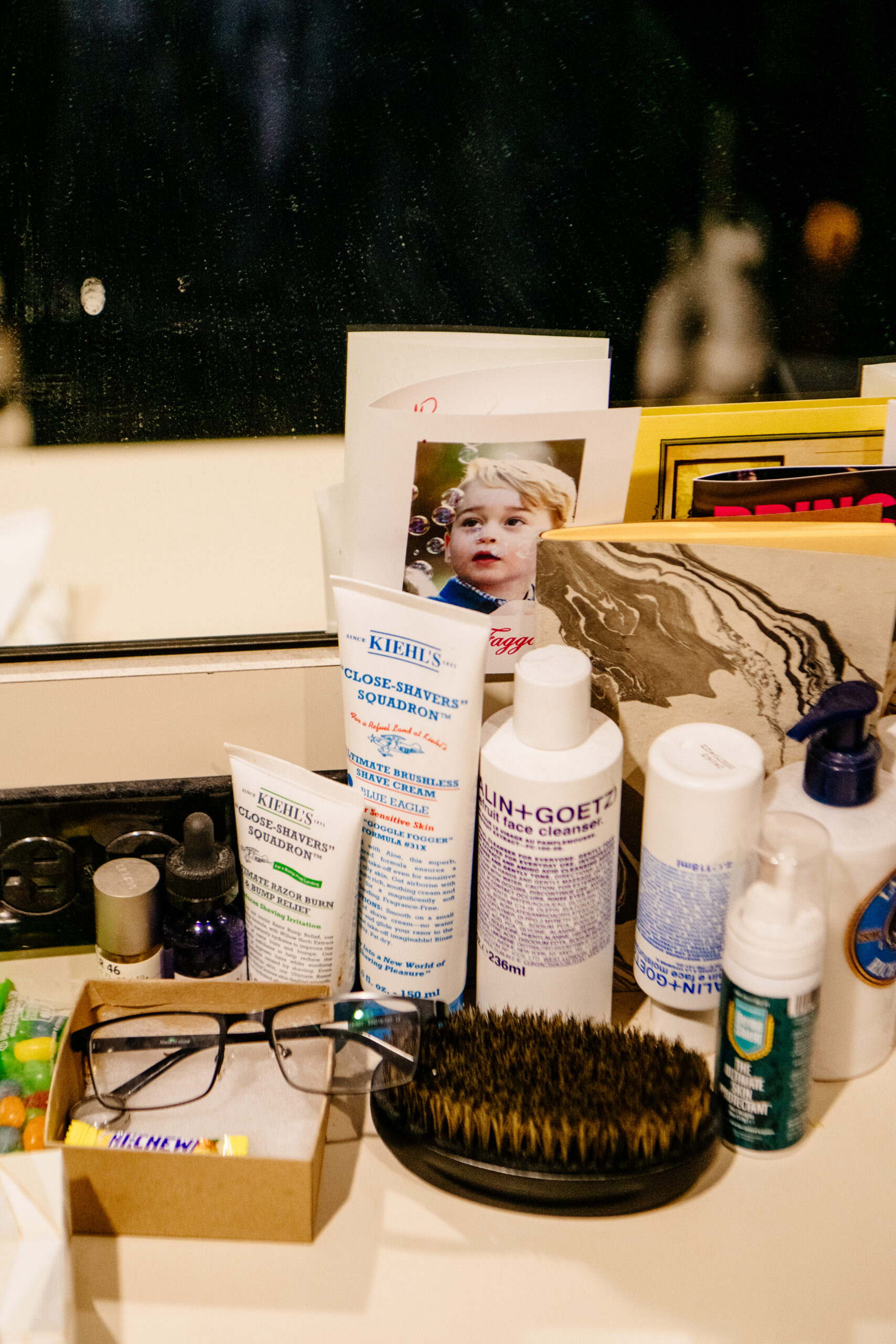
TANNAHILL: Thank you. One thing I wanted to ask you was, when is a piece done? I mean, something that I’ve always admired and been fascinated about is your relationship with plays as a kind of living text, as a text that is, in a way, never finished and always in conversation with the present.
KUSHNER: [Johann Wolfgang von] Goethe said that he realized that there are some plays that seem to be completed, and then he says there are some plays he calls his incommensurables—they’re just never going to be finished. I think that there are some plays that are like that. They just arrive at their perfect shape, at the best shape that you’re going to be able to give them. And then other plays have a kind of radical built-in disequilibrium—you could take out this, put this in, you could expand this, it could get longer. And famously, in two-part plays, including Faust part two and Peer Gynt part two, they tend to be these big, shaggy, wooly sort of explosions. I mean, the first part of Faust and the first part of Peer Gynt are perfectly shaped with plays. It’s like the Sgt. Pepper’s Lonely Hearts Club Band and then the White Album.
TANNAHILL: With Angels [in America], I was curious when you first knew you had a play. I know that you had an interest in Roy Cohn at the age of 10 when your father gave you Fred J. Cook’s The Nightmare Decade, and then later you studied medieval studies, was it?-
KUSHNER: Period and medieval studies major at Columbia, yeah.
TANNAHILL: Of course, that’s also within the scope of Angels, the understanding of plague as a recurrent societal condition that almost every generation contends with. But when did you sort of sense that you had a real play?
KUSHNER: Oh, I mean, I was hired to write it. [Laughs] My first play A Bright Room [Called Day] was done at the Eureka. Oskar Eustis directed it, and then Oskar offered me a commission and we applied for an NEA grant. This is how much things have changed. This was during Reagan. And we were completely honest and said, “It’s going to be a play with five gay men and Roy Cohn.”
TANNAHILL: Right.
KUSHNER: But we applied for this NEA grant. It was a grant to give theater companies money. The playwright got a check and we got the grant. It was like a shock. No questions asked. They said, “Sure, here.” So I started writing the play. I’ve said many times that I think that the subtitle of the play, “A Gay Fantasia on National Themes,” had something to do with getting a check from the federal government with a seal that says, “The People of the United States of America.” So I had to make it something big. Oskar wanted it to be shorter than Bright Room, so he made me sign a contract that it would only be two-and-a-half hours long with an intermission. I wrote the first hour, which is close to what is now the first act, and it was 60, 70 pages. I thought, “Okay, I’m in trouble.” Because that’s half the play and I wasn’t anywhere near the angel coming through, which was supposed to happen at intermission. So I sent it to a bunch of people and I said, “What am I doing?” And they said, “Keep going.” So I kept going.
TANNAHILL: Wow.
KUSHNER: I think I knew that it was going to be a play when I wrote the big “democracy in America” scene. I thought, “This is like the best thing I think I’ve ever written.” And for the play to contain that scene, it just was going to be much bigger. I didn’t think it was going to be a two-evening long thing, but then it sort of became clear that that’s where we were headed. It was a wild thing. Anyway, how did Jeremy O. Harris get involved with Prince Faggot?
TANNAHILL: Jeremy’s been such an extraordinary champion of other artists. I know he mentions that [Edward] Albee was a bit like that too, how he would really champion peers and produce their work. He’s done so without any compromise and has really tried to push me to make the most radical piece I could possibly make. We were initially going to produce it in London, and the company that was going to produce it was on board, but their board of directors basically said, “You have to change all the names. It’s just a non-negotiable. These have to be fictional characters.” I called Jeremy and I was like, “I think this is going to just totally defang this play.” And he said, “Forget about it. We’re going to do it in New York. I want to make the play that you want to make.” So he’s been with me for the last five years on this, finding the funding to support the workshops and ultimately help bring it to Playwrights Horizons and Soho Rep.
KUSHNER: I think he’s an absolutely astounding writer. But then I was sort of stunned by how he took all the acclaim from Slave Play and then immediately turned it into a kind of mission to share what he had earned by promoting the work of other people. I mean, yes, Edward Albee did that. I don’t want to speak ill of Edward, but it was a little bit of a poison. I mean, he paid for the writing of The Boys in the Band and then immediately told everybody how much he hated the play.
TANNAHILL: Like a true queen. Oh my god.
KUSHNER: He was a certain kind of queen.
TANNAHILL: Yeah, nasty.
KUSHNER: I loved him and admired him as a writer enormously.
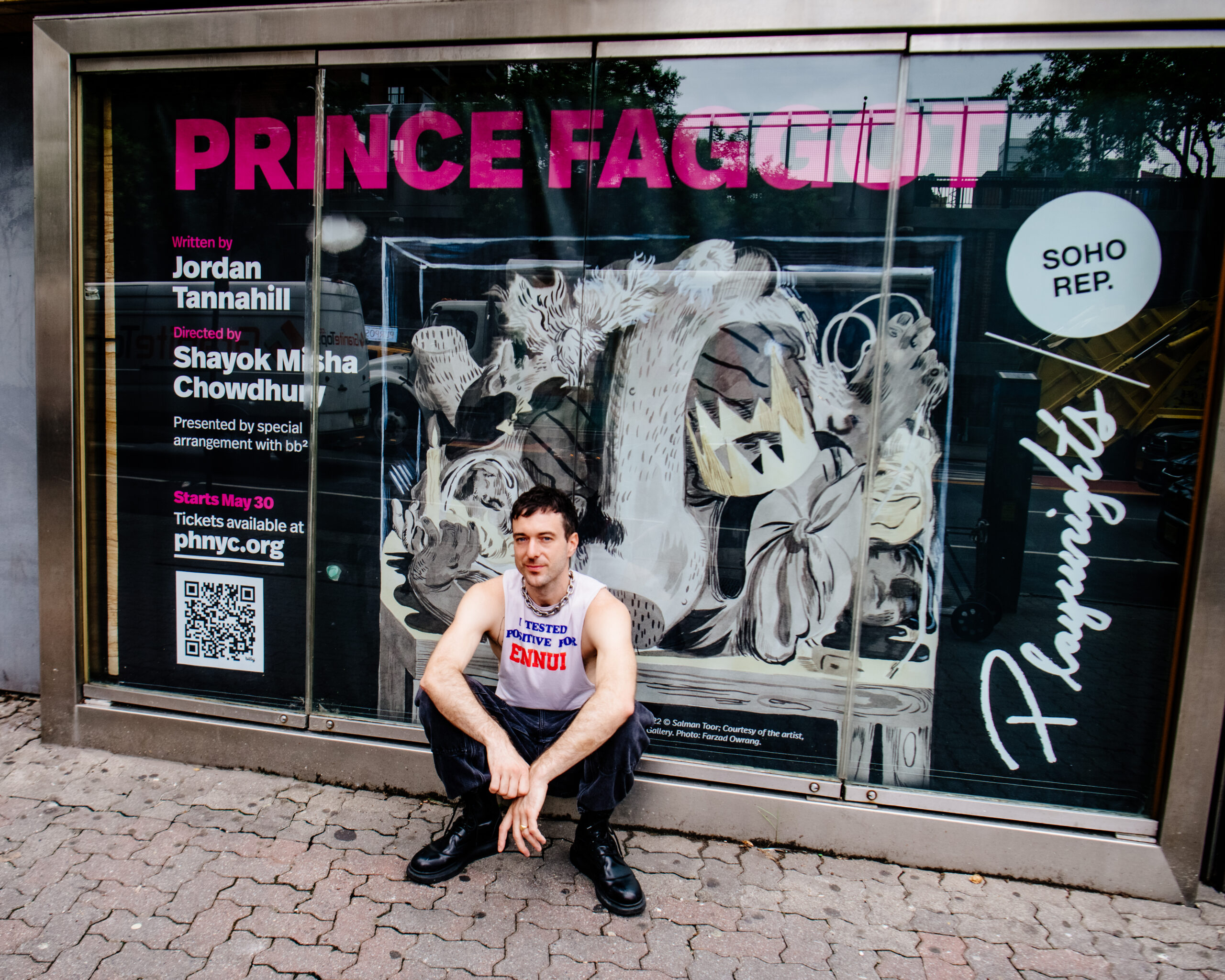
TANNAHILL: Genius. I mean, I would say that Jeremy is probably the first celebrity playwright since you. I’ve talked about this a lot with Jeremy. Someone like myself, who will be content in his obscurity, is interested in how his life changed in the wake of Slave Play. But how did you contend with the radical change in your life after Angels?
KUSHNER: It was a lot. My husband Mark Harris always says that success is a character test, that you’ll see what you’re made of because there’s always the possibility of just completely falling apart and becoming bizarre. I don’t think I did that. I think I sort of held it together. And none of us will ever be what Edward Albee was, and certainly not [Arthur] Miller and [Tennessee] Williams and [Eugene] O’Neill. Those guys were gods. They were highly respected and very, very wealthy filmmakers. The rest of us, we can’t take ourselves too seriously. We’re very lucky. We’re sort of famous.
TANNAHILL: And you’ve utilized that profile to immense political ends. I mean, you are an activist in every sense of the word. You have stuck yourself out there so many times. I think it’s an important example for artists, at this time more than ever.
KUSHNER: Well, I appreciate that. I don’t know about me as a model, but certainly Arthur Miller was a great role model for me in that regard. But what’s your life like now? I mean, do you feel that there’s a change happening?
TANNAHILL: I just have more guys coming up to me at raves who know my work. That’s about as far as my reach will extend, I think. Maybe it’ll get me laid in the dark room a few more times, but that’s about it, I would say.
KUSHNER: Are there plans now to move Prince Faggot? Because when we met the first time after the reading I was this kind of crow saying, “Don’t move this to Broadway because Broadway is no fun, and you just sit and watch the box office either do what it’s supposed to do or not.” But what do I know?
TANNAHILL: Personally, I don’t think this is a Broadway show. I mean, if somehow it gets there, that would be a true miracle. But I think it will have a life beyond this. In its heart, it’s a kind of scrappy downtown show, and I think it works best in that context. But we’ll see. It’s my debut in New York and I really have no idea how commercial theater and cultural philanthropy works at all. The gala season of it all. I mean, it’s all such an education for me coming from a state-funded model. So I’m just along for the ride, to be honest.
KUSHNER: Is it going to go to London? It has to go to London…
TANNAHILL: That would be something. I don’t know.
KUSHNER: Are no British theaters asking about doing it?
TANNAHILL: Some people are kind of inquiring, but I don’t know of any real solid plan at the moment. I initially did write it for a London context. Now it does feel more American in its sensibility because of the ensemble that I ultimately have worked with on it.
KUSHNER: I mean, it would be so shocking if the fear of offending the Royal family—
TANNAHILL: Prevented it.
KUSHNER: As Ezra Pound said, the British are not a religious but a theatrical people. Theater is their religion. They all see so much theater and they do so much theater. They’re very smart, but they’re a little jaded. And in New York, they’re whatever. I don’t want to say anything…
TANNAHILL: Yeah. There’s obviously great musicals made every year, but there’s a lot of corporate schlock, shall we say. And I think a lot of great playwrights are understandably tempted with a good paycheck to make work that feels, I think, below their integrity, doing these easy film adaptations or book adaptations that feel very—
KUSHNER: Well, you know, we don’t have health insurance.
TANNAHILL: Exactly. I really don’t blame them. But I have tattooed across my chest an oath, which is to always engage with integrity, at least artistically speaking, and not to be too distracted by the magpie’s shiny metal.
KUSHNER: Well, you gave a perfect example of it. The way that Prince Faggot explores and examines one of the most celebrated and important of all dramatic literary genres, which is the English history play. It’s not George; it’s our George. I think every great work has its near brush with complete obscurity and failure, and I think that would’ve been yours. It would’ve still been a lovely, beautiful play, but it would not have had its profoundly unsettling power. So I wanted to talk to you a little bit about kink, which was interesting to me because it’s so rarely represented on stage or in film. In a play about power, it makes so much sense that you’ve explored it. Kink is there on stage, and it’s shocking.
TANNAHILL: Well, when I was writing this play back in 2020 sort of in the depths of lockdown, I found myself living in London without any source of income, really, beyond the government handouts. I mean, all my commissions and productions were paused. Here I am living in one of the most expensive cities in the western world, so I began working as a fetish sex worker. I had gear and I made a RentMen profile. I can’t compete with the plethora of great options on RentMen, so I really had to find my angle, and I’m a good storyteller. I’m good at roleplay. I can really provide a very cohesive fantasy. So I really cornered that market and began having a series of clients. Most of them were businessmen who were in town and had hotels—a lot of them from the Gulf, from Asia as well, some Americans, some Tory politicians, a whole gamut of people. But a lot of them wanted puppification and I’d be their master. I would go through this whole kind of transformation ritual with them. They wanted to be mostly dommed, or they wanted to be sort of submissive, to abnegate their agency. A lot of them had very high-profile jobs, which required a lot of decision-making, a lot of management, and they wanted to, in some ways, abdicate that. It was a kind of embodied therapy in some way.
KUSHNER: Yeah.
TANNAHILL: So I really wanted to collapse the distance between my lived experience and what I was writing about. That was really part of my own project around shame in my late 20s and early 30s, really trying to work through the last vestiges of my own shame around sex and my body and my sexuality. It’s like, “I will wake up and have a coffee and make breakfast and maybe call a friend, and then I’ll go and turn this businessman into a dog, and then I’ll come home and I’ll scroll on my phone for a bit.” All those things were just part of my day, and I wanted to place them on stage in a way that doesn’t have any kind of hierarchy or censorship.
KUSHNER: Yeah.
TANNAHILL: So that was really part of the project with Prince Faggot, to give language and depict my life and also the lives of queer people that I knew in London, at least. And I think a lot of audience members do see their lives on stage and do see themselves in these scenes.
KUSHNER: It’s voyeurism, and titillation is always a part of it. It’s ridiculous to pretend otherwise. But I found it really amazing in terms of making the personal political and exploring how, in this relationship, there’s this gigantic and sort of imponderable weight of history crashing in on these two guys and making it absolutely impossible for them to meet in any kind of space that’s protected from that. And sex and kink and S&M are ways of safely rehearsing power differentials—
TANNAHILL: Absolutely.
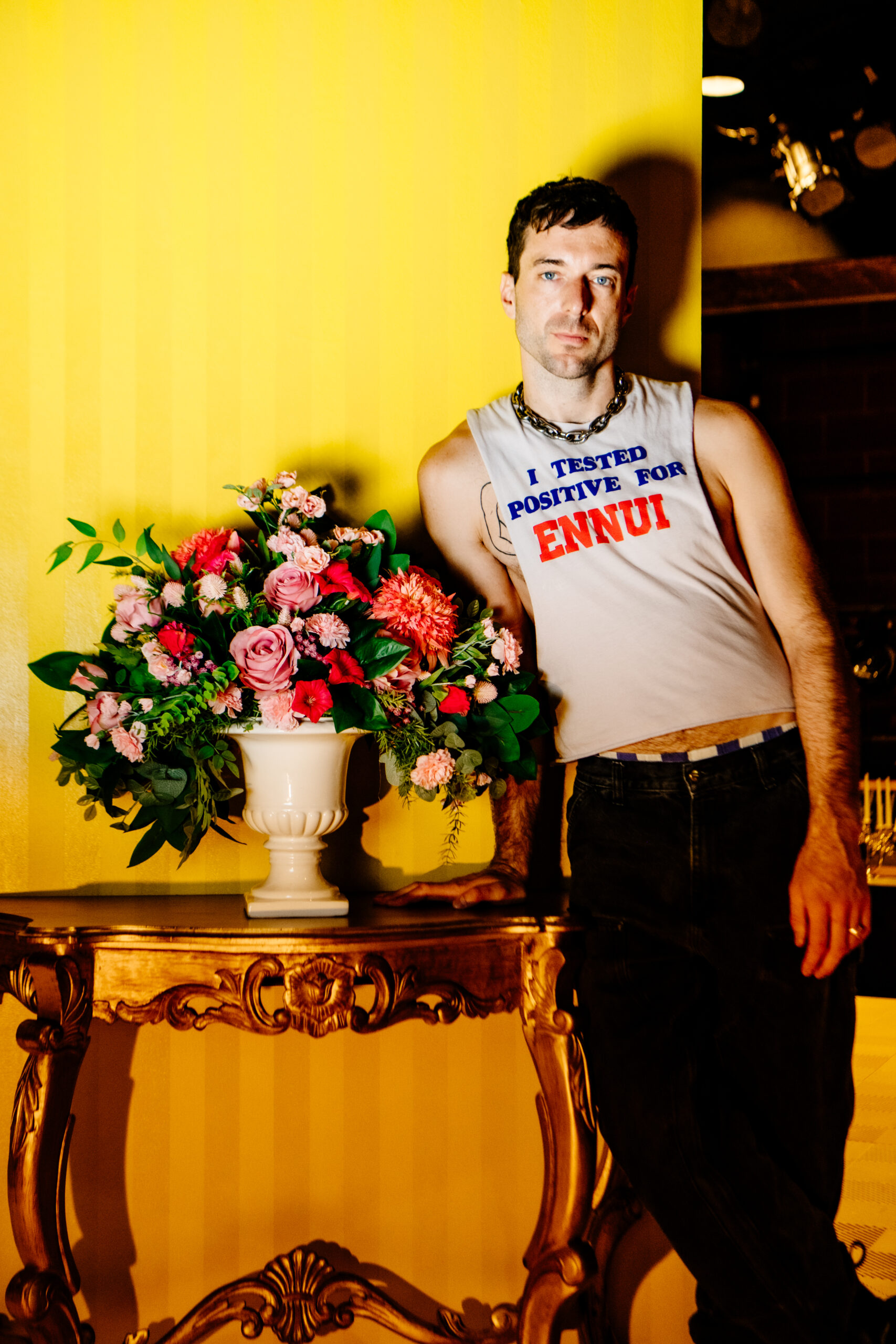
KUSHNER: When the sex is buried and it’s imposed into the public sphere, you wind up with Stephen Miller and Donald Trump and MAGA’s absolute hunger for the spectacle of suffering.
TANNAHILL: Yeah. The sadistic elan of fascism.
KUSHNER: I mean, where these fantasies become projected in a way that’s absolutely abhorrent.
TANNAHILL: Yeah. One of the things that was really important was to ensure that those less initiated with discourses on kink didn’t perceive the presence of kink in the show as merely for shock value or for sensationalism. And then with David Greenspan’s monologue about fisting being, in some ways, a kind of survival mechanism that emerged. I mean, there were lesbians teaching gay men how to fist in the early days of the AIDS epidemic in part as a way of decentering the phallus as the sole focus of sexual pleasure.
KUSHNER: I had not really thought of that.
TANNAHILL: Speaking of the depictions on stage that were radical and probably historic, I think of the cruising scene in Angels in America and the impact that that had on me as a young person. That surely must have been one of the very first depictions of cruising on Broadway, I imagine.
KUSHNER: The first, I think, is probably Harvey [Fierstein] in Torch Song Trilogy.
TANNAHILL: Oh, true.
KUSHNER: Which I saw downtown. And it’s just him on stage and it’s very funny. He’s in a back room and somebody just comes behind him and starts fucking him and he’s trying to have a conversation. I had just come out of the closet when I saw that and I was thinking, “Is he really going to do that on Broadway?” And he did.
TANNAHILL: Yeah.
KUSHNER: Before I go, what are you doing now? What’s next? That’s the most hateful question in the entire spectrum of questions you can ask a writer, but…
TANNAHILL: I have just finished a novella. It’s set at Teufelssee, which is the cruising lake outside of Berlin, this small glacial lake. And it’s sort of this spectral story about time that takes place in the cruising grounds outside of or just adjacent to this lake. I’m going to be entering the copywriting process for that. But I just cannot overstate my level of gratitude, Tony, for your generosity in seeing the show, seeing the workshop of the show, taking the time to speak with me. I mean, when I saw you in P-Town, you quite literally gave me the shirt off of your back to walk home as I was poorly dressed for the weather.
KUSHNER: It was a cold day and you seemed cold.
TANNAHILL: It was windy.
KUSHNER: You were not adequately dressed.
TANNAHILL: It was lovely seeing you and Mark.
KUSHNER: We have to embrace the indirect power of our chosen profession for it to be any good. When something new and profoundly human and generous-spirited and moving and poetic comes along, you think, “Okay, so not everything the human race is up to is terrible. There’s still this possibility that we’re going to create beautiful new things.” So I feel enormous gratitude to you and I can’t wait to see what comes next.
TANNAHILL: Thank you so much.

